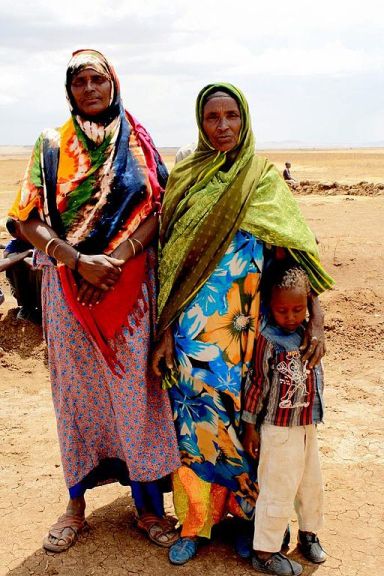Four key reasons why climate change adaptation and mitigation need a gendered approach
DOI:
https://doi.org/10.31273/eirj.v2i1.105Keywords:
climate change, gender, food systems, agriculture, adaptationAbstract
Climate change is having a growing impact on every human activity, especially on agriculture with altered rainfall patterns and an increased number and intensity of extreme weather events. This article argues that efforts to mitigate and adapt to climate change must consider whole food systems – rather than the sole production of food – whilst embracing a conscious gendered approach. Women are the main victims of hunger, but they are also the main actors of global food systems, they greatly contribute to their household’s and community’s wellbeing and detain a rich and often untapped knowledge of food systems. Promoting the role of women in our global food systems enhances the inclusion of criteria mainly valued by women such as resilience, diversity and nutrition, which are paramount for climate change mitigation and adaptation.
Photo credit: By OxFam East Africa [CC-BY-2.0 (http://creativecommons.org/licenses/by/2.0)], via Wikimedia Commons
Downloads
References
Black, R.E., Victora, C.G., Walker, S.P., Bhutta, Z.A., Christian, P., de Onis, M., Ezzati, M., Grantham-McGregor, S., Katz, J., Martorell, R., Uauy, R., 2013. Maternal and child undernutrition and overweight in low-income and middle-income countries. The Lancet 382, 427-451.
Conway, G., 1997. The Doubly Green Revolution: Food for All in the Twenty-First Century, Penguin Books Ltd., London, UK.
Cooray, A., Potrafke, N., 2011. Gender inequality in education: Political institutions or culture and religion? European Journal of Political Economy 27, 268-280.
De Schutter, O., 2010. Agroecology and the right to food. United Nations, New York.
De Schutter, O., 2012. Women's rights and the right to food. United Nations, New York.
Demont, M., Rutsaert, P., Ndour, M., Verbeke, W., 2013. Reversing Urban Bias in African Rice Markets: Evidence from Senegal. World Development 45, 63-74.
Evenson, R.E., Gollin, D., 2003. Assessing the Impact of the Green Revolution, 1960 to 2000. Science 300, 758-762.
FAO, 2011. The State of Food and Agriculture. Women in Agriculture – closing the gender gap for development. FAO, Rome.
FAO, 2013. FAO stat, Rome.
FAO CFS, 2011. Policy Roundtable: Gender, Food Security and Nutrition, UN Food and Agriculture Organisation Committee on World Food Security, Rome.
Glover, D., 2008. Made by Monsanto: the Corporate Shaping of GM Crops as a Technology for the Poor. STEPS Centre, Brighton, UK.
Herrmann, S.M., Tappan, G.G., 2013. Vegetation impoverishment despite greening: A case study from central Senegal. Journal of Arid Environments 90, 55-66.
Herzog, T., 2009. World Greenhouse Gas Emissions in 2005 - Working Paper. World Resources Institute.
HLPE, 2012. Climate change and food security. A report by the High Level Panel of Experts on Food Security and Nutrition of the Committee on World Food Security. HLPE, Rome.
Hoddinott, J., Haddad, L., 1995. Does Female Income Share Influence Household Expenditures? Evidence from Cote d'Ivoire. Oxford Bulletin of Economics and Statistics 57, 77-96.
Holt-Gimenez, E., Altieri, M., Rosset, P.M., 2006. Food First Policy Brief No. 12: Ten Reasons Why the Rockefeller and the Bill and Melinda Gates Foundations' Alliance for Another Green Revolution Will Not Solve the Problems of Poverty and Hunger in Sub-Saharan Africa. Institute of Food and Development Policy, Oakland.
Holt-Giménez, E., Altieri, M.A., 2012. Agroecology, Food Sovereignty, and the New Green Revolution. Agroecology and Sustainable Food Systems 37, 90-102.
IAASTD, 2009. Agriculture at a Crossroads. A synthesis of the Global and Sub-Global IAASTD Reports. International Assessment of Agricultural Knowledge, Science and Technology for Development (IAASTD), Washington, DC.
IPCC, 2014. Climate Change 2014: Impacts, Adaptation, and Vulnerability. Contribution of Working Group II to the Fifth Assessment Report of the IPCC [Field, C., V. Barros, K. Mach and M. Mastrandrea (eds.)]. Cambridge University Press, Cambridge, UK and New York, NY, USA.
Patel, R., 2012. The Long Green Revolution. The Journal of Peasant Studies 40, 1-63.
Pionetti, C., 2005. Sowing Autonomy: gender and seed politics in semi-arid India. International Institute for Environment and Development (IIED), London, UK.
Rioux, J., Ganli, A., Amouzou, K., Ndiaye, G., Geniez, P., Perenze, L., 2011. Analyse Globale de la Vulnérabilité, de la Sécurité Alimentaire et de la Nutrition (AGVSAN) - Données primaires collectées entre Avril et Juin 2010 - République du Sénégal 2010. Gouvernement du Sénégal, FAO, Unicef, Programme Alimentaire Mondial, Banque Mondiale, Coopération Luxembourgeoise, Fondation Bill & Melinda Gates, Fonds Espagnols pour les OMD, USAID, Rome.
Rockefeller Foundation, 2013. Strengthening Food Security: Alliance for a Green Revolution in Africa (AGRA).
The Lancet, 2013. Maternal and Child Nutrition - Executive Summary, London, UK.
Troubé, C., 2007. Les nouvelles famines - des catastrophes pas si naturelles. Editions Autrement, Paris.
World Bank, 2009. Gender in Agriculture Sourcebook. World Bank, Washington, DC.

Published
Issue
Section
License
Authors who publish with this journal agree to the following terms:
Authors retain copyright and grant the journal right of first publication with the work simultaneously licensed under a Creative Commons Attribution License (CC-BY), which permits use and redistribution of the work provided that the original author and source are credited, a link to the license is included, and an indication of changes which were made. Third-party users may not apply legal terms or technological measures to the published article which legally restrict others from doing anything the license permits.
If accepted for publication authors’ work will be made open access and distributed under a Creative Commons Attribution (CC-BY) license unless previously agreed with Exchanges’ Editor-in-Chief prior to submission.
Authors are able to enter into separate, additional contractual arrangements for the non-exclusive distribution of the journal's published version of the work (e.g., post it to an institutional repository or publish it in a book), with an acknowledgement of its initial publication in this journal.
Authors are permitted and encouraged to post their work online (e.g., in institutional repositories or on their website) prior to and during the submission process, as it can lead to productive exchanges, as well as earlier and greater citation of published work. (see: The Effect of Open Access)
